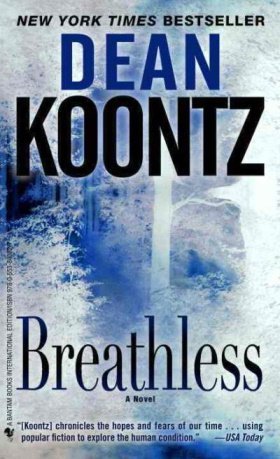“Where’s Jim?” she asked.
“In the barn. He sent me to get you. He thinks something’s wrong with one of the horses.”
“Wrong? What’s wrong?”
Henry shrugged. “I don’t know horses.”
“Which is it—my Beauty or Samson?”
“The one in the second stall.”
“Samson. Jim loves that horse.”
“I don’t think it’s serious,” Henry said. “But it’s something.”
After rinsing her hands under the faucet and quickly drying them on a dishtowel, Nora hurried out of the kitchen.
Henry followed her through the house and onto the front porch.
Descending the steps, she said, “So you’ve never ridden?”
“Only things that have wheels,” he said.
“There’s nothing like saddling up and riding to the high meadows on a crisp day. The world’s never more right than it is then.”
Crossing the yard toward the barn, he said, “You make it sound appealing. Maybe I should learn.”
“You couldn’t find a better riding instructor than Jim.”
“Successful farmer, poet, horseman. Jim is a hard act to follow, even for an identical twin.”
He spoke only to have something to say, to keep her distracted. Nothing in his words revealed his intentions, but something in his tone or some unintended inflection given one word or another must have struck her as wrong.
Half a dozen steps short of the barn, Nora halted, turned, and frowned at him. Whatever she heard in his voice must have been even more evident in his face, because her eyes widened with recognition of his nature.
Our five senses are in service to our sixth, and the sixth is the intuitive sense of danger to body or soul.
He knew that she knew, and she confirmed her knowledge by taking a step backward, away from him, and then another step.
When Henry withdrew the pistol from under his jacket, Nora turned to run. He shot her in the back, again as she lay facedown.
After putting away the gun, he turned her on her back. He seized her by the wrists and dragged her into the barn and placed her beside her husband.
The first shot must have killed her instantly. Her heart had pumped little blood from her wounds.
Her eyes were open. For a long moment, Henry stared into them, into the nothing that had once appeared to be something, into the truth of her, which was that she had always been nothing.
Until this day, he had never killed anyone. He was pleased to know that he could do it, pleased also that he felt neither guilt nor anxiety.
Like Hamlet, he had no moral existence, no sense of any sacred order. Unlike Hamlet, his condition did not cause him to despair.
Henry’s major at Harvard had been political science. He minored in literature.
Prince Hamlet had something to teach those in either discipline. In literature classes, he was assumed to be a tragic figure, sworn to enforce the laws of a sacred order in which he could no longer believe. In certain political-science circles, he was used to illustrate that violence and anarchy can be preferable to indecision.
Henry lived free of despair and indecision. He was a man of his time and, he liked to think, perhaps a man for the ages.
Later, he would use the couple’s backhoe to excavate their final resting place. In the Land Rover lay a fifty-pound bag of lime, which he would pour atop them in their grave, to facilitate decomposition and to mask the odor of it, reducing the chances that some carrion eater would try to dig its way to them.
Leaving the cadavers in the barn, Henry went to the Rover, put up the tailgate, and removed two small suitcases. Each of them held a million dollars in hundreds and twenties. He carried them into the house.
Seven

On his way from Chicago to a conference in Denver, Dr. Lamar Woolsey took a side trip to Las Vegas.
The white sun blistered the pale sky. By late afternoon, a heat sink comprised of the towering hotels, the streets, the vast parking lots, and the surrounding desert had stored enough radiant energy to keep the city warm throughout the night.
In the taxi, from the airport to the hotel, Lamar watched rising thermals distort the more distant buildings, making them shimmer like structures in a mirage. In the foreground, windows and glass walls, bright with solar reflections, appeared to buckle, an illusion caused by the changing perspective of the taxi in relation to the buildings.
Illusion and reality. The former enchanted most people these days; the latter had been out of fashion for years. This city of casinos stood as proof that humanity preferred fantasy over truth.
In his hotel room, Lamar changed into white tennis shoes, white slacks, a blue Hawaiian shirt, and a white sport coat.
In a money belt under the shirt, he carried ten thousand in hundred-dollar bills. He folded two thousand more into his pockets.
Wherever he went in the world, he never gambled at a casino in his hotel. That made it too easy for a pit boss to learn his name.

























